Best cycling socks 2025: Funky and functional top performers
From high-performance lightweight socks to three-season winter warmers, here are our favorite models - rated and reviewed
The latest race content, interviews, features, reviews and expert buying guides, direct to your inbox!
You are now subscribed
Your newsletter sign-up was successful
The best cycling socks are a great way to showcase your personality through your riding gear. In recent years, there has been a notable shift as brands have moved away from black and primary-coloured cycling apparel, with many brands turning to pastels and earthy options to brighten up many bikers' wardrobes.

Pearl Izumi socks
However, there are few topics in cycling more divisive than socks. Yes, I am serious - should they be long, short, white, black, patterned, and even aero? Everyone has an opinion. The UCI even has a section in the rulebook about socks, which states, "socks and the best cycling overshoes used in competition cannot rise higher than the midpoint between the ankle bone (lateral malleolus) and the head of the fibula (fibular head)".
What should be less contentious is that a decent pair of cycling-specific socks will be more comfortable and better suited for riding in, regardless of the colour. But what's the difference between a cycling sock and a sports sock?
The technical fabrics and construction techniques in cycling socks will undoubtedly be more comfortable, but more importantly, they will wick away sweat, helping to keep your feet drier. Features such as arch support and compression also help reduce fatigue, minimise hot spots, and provide a better fit with the best cycling shoes.
The best winter cycling socks will also help keep moisture away from your feet, allowing them to stay warm and dry. Just like the best winter cycling gloves, they help insulate your extremities against the cold. When choosing either summer or some of the best winter cycling shoes, remember to allow room for both thick and thin socks to avoid restricting blood flow and ultimately getting cold feet.
Best cycling socks 2025: tested and rated
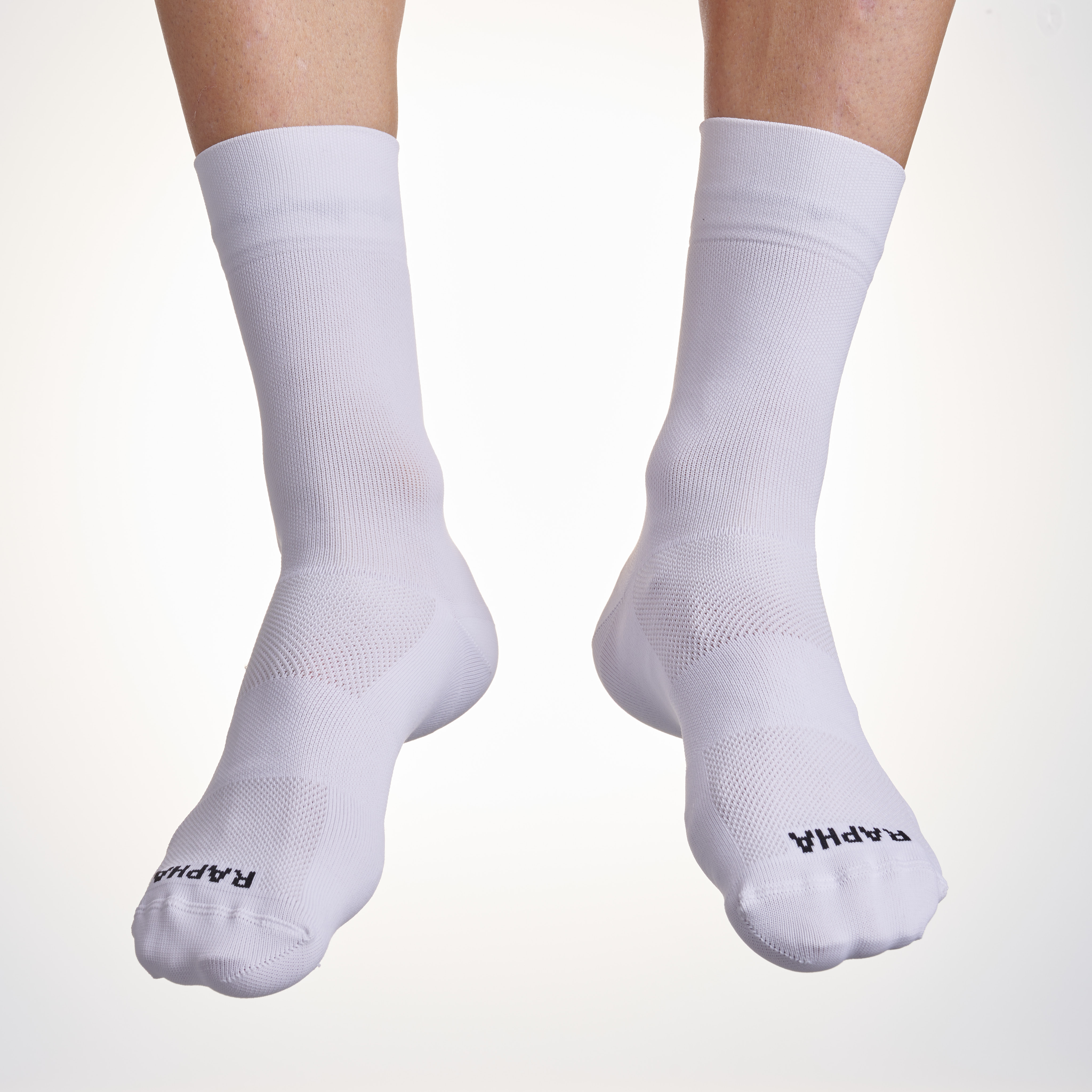
The fabric of Rapha’s Pro Team socks felt luxuriously soft against our skin and has a reassuring thickness whilst still being breathable and wicking - helped by the mesh panels across the ‘low-wear’ areas of the sock (the top of the foot and around the arch) for better longevity. An ideal workhorse performance sock for temperate climates.
+ Luxurious-feeling fabric
+ Breathable and wicking
- Not the best range of colours
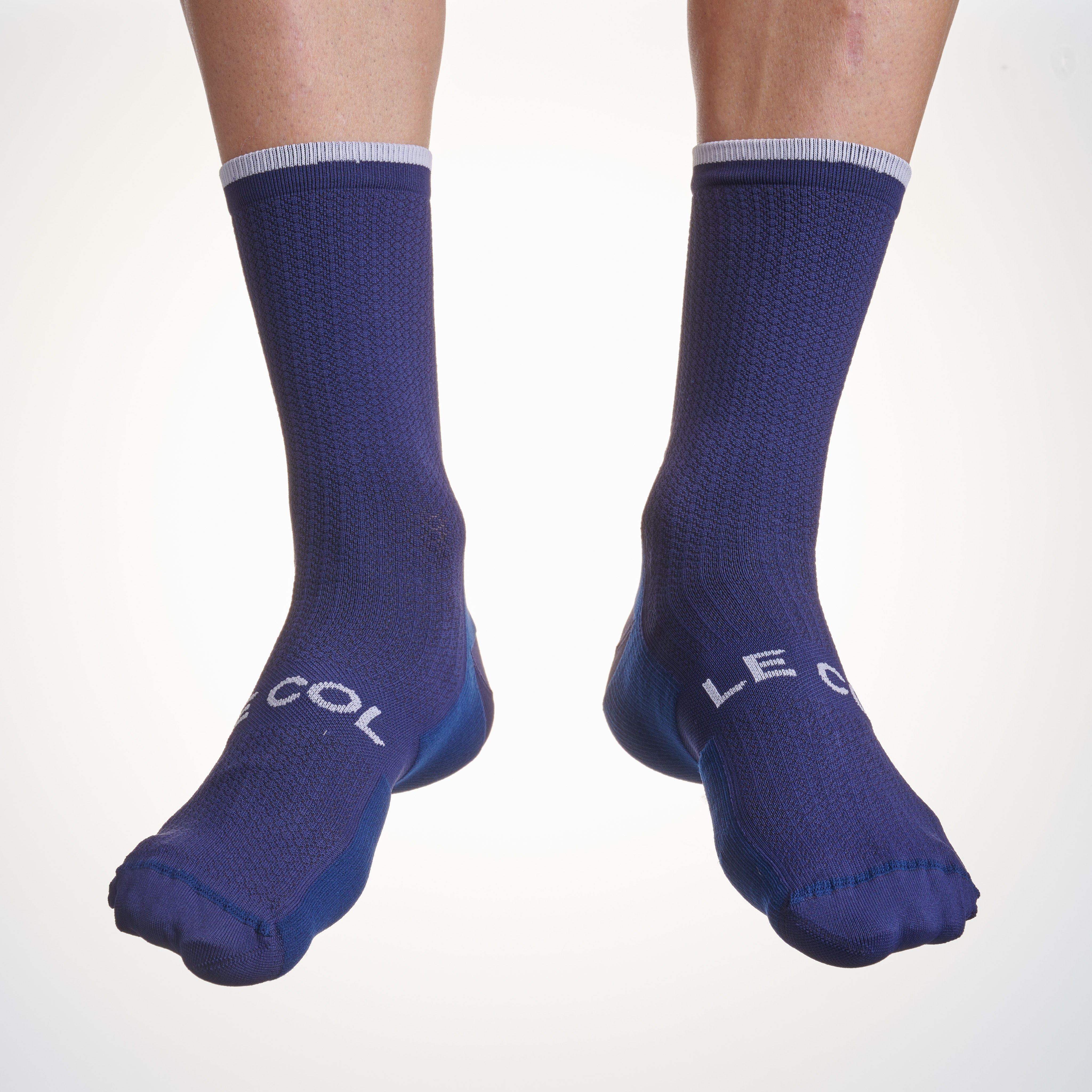
Best described as a three-season performance sock for temperate regions. The upper section is a medium-weight mesh fabric, which is fast-wicking and breathable. There are thicker panels across the sole and heel, which gave us a bit of warmth and also promise decent longevity (though more riding is needed to confirm the latter).
+ Warmer and more material in high-wear areas
+ Large range of colours
- Warmer than other models
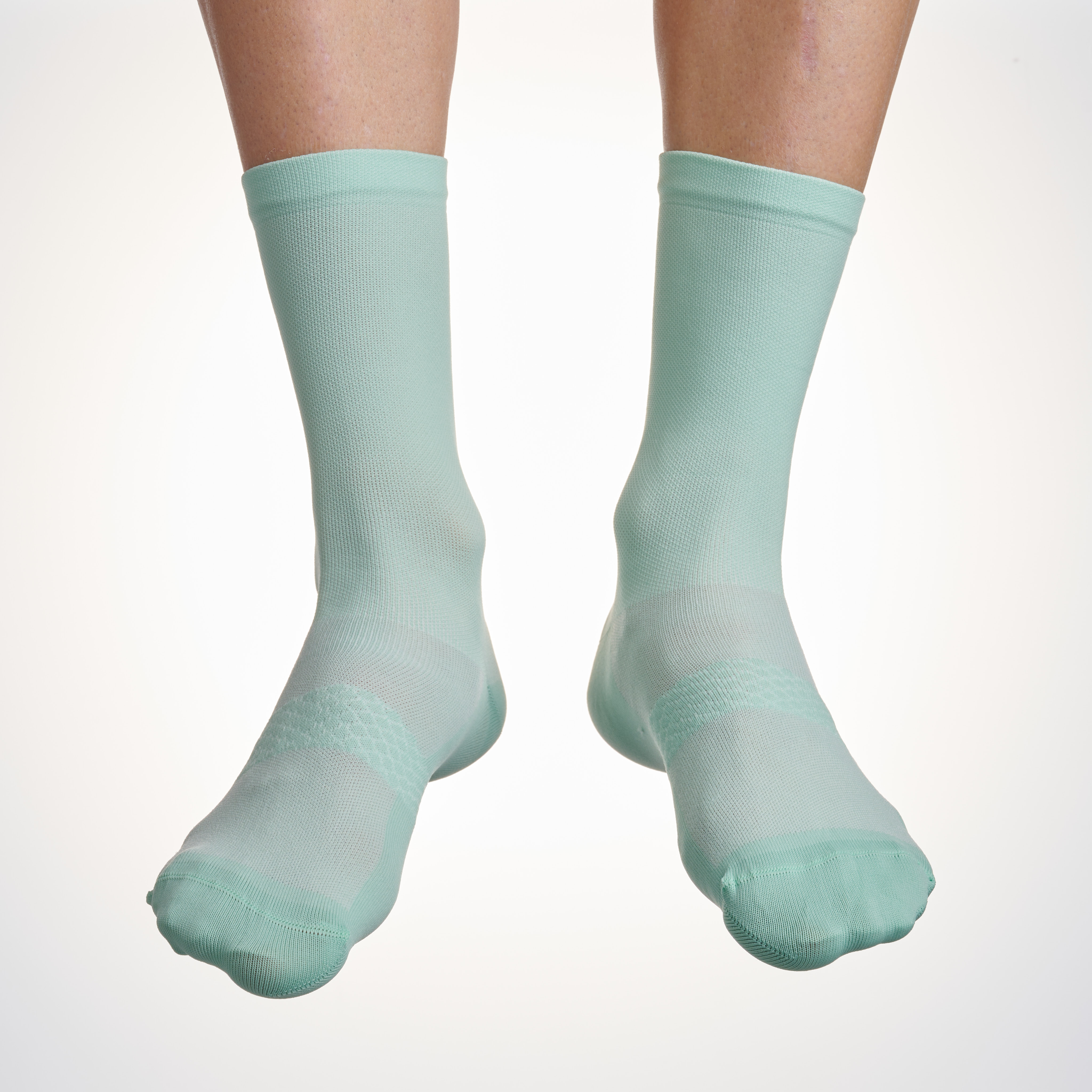
These socks are super thin and also super soft. Whereas the Castelli Superleggera and Assos Essence socks match Velocio for heat dissipation and breathability, they felt coarser in comparison, with the Velocio offering a soft feel against the skin. It should be acknowledged that there may be questions of durability and how hardwearing these are, though.
+ Soft against the skin
+ Highly breathable and wicking
- Don't feel hardwearing
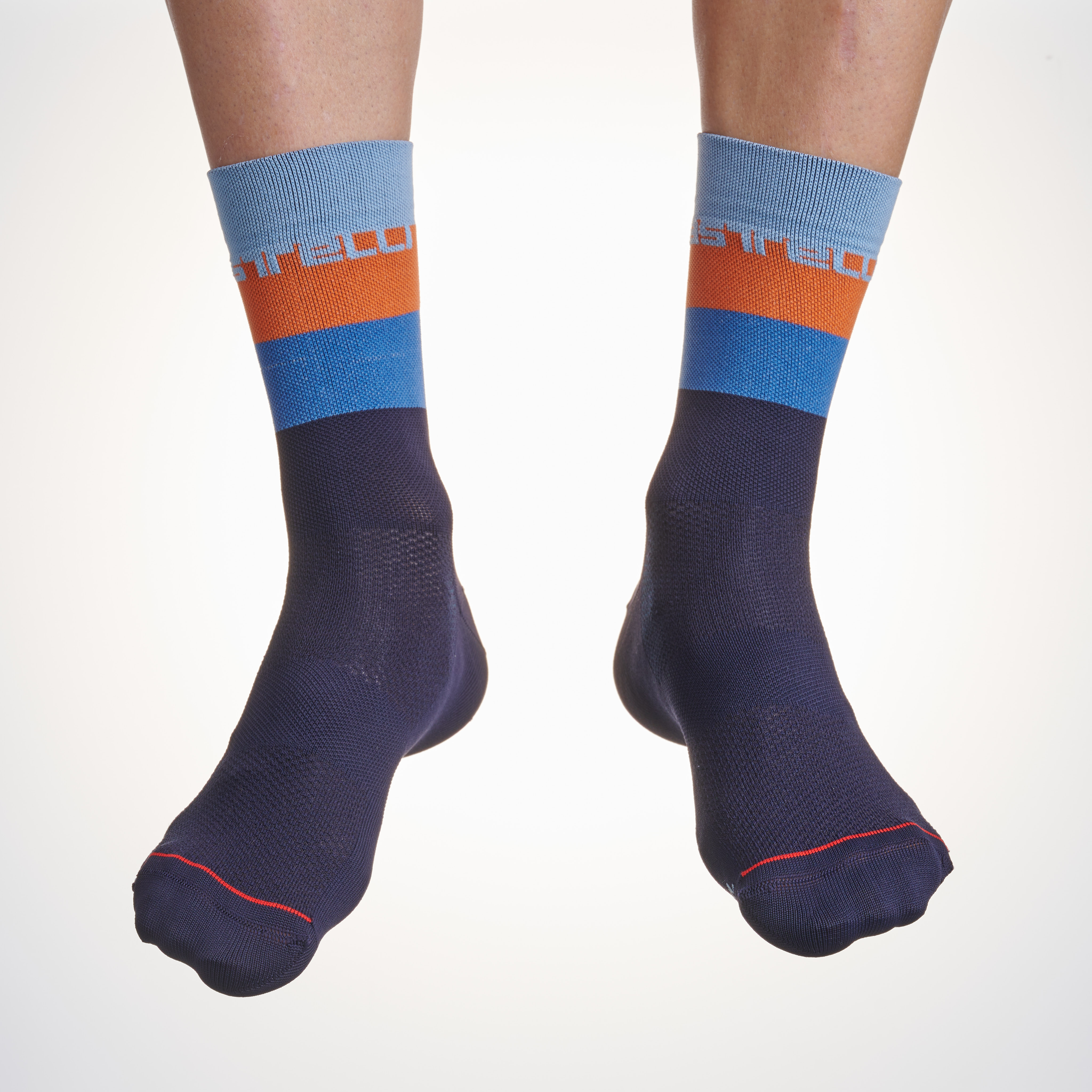
The material around the ankle of these socks is a little thicker than the section around the foot, which also features mesh panels running along the top. It’s a construction that we thought would work really nicely in places with mild summers or, for hotter regions, in the spring/fall. Also, the retro look and colour choice is worth mentioning as well.
+ Good mix of colours
+ Comfortable construction
- Hard to match with non-Castelli kit
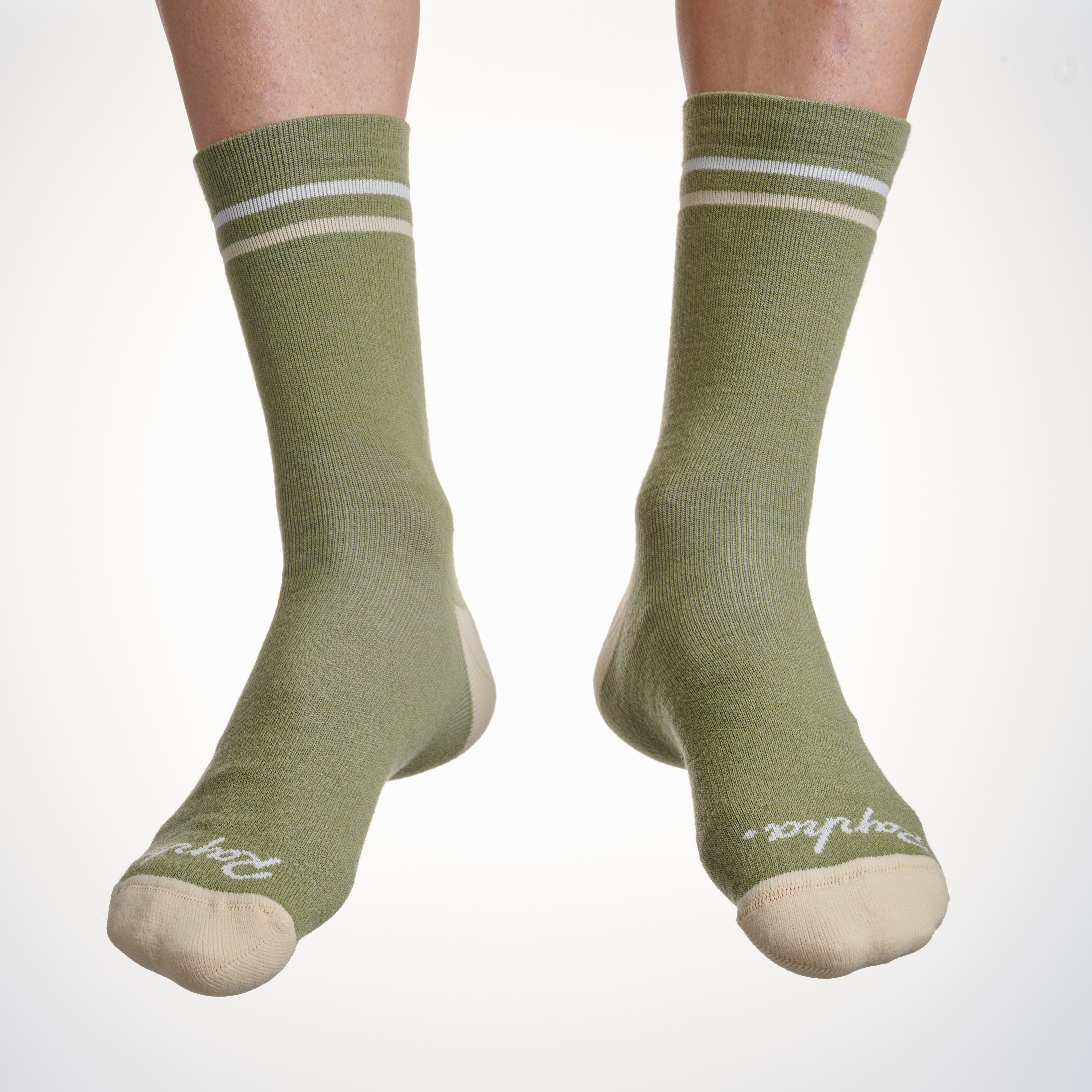
These are three-season Merino socks rather than an ultra-thick deep winter sort of pair - and as a result, they are incredibly versatile. The breathability and moisture-wicking are sufficient for riding in the summer, although we felt that they would be a bit warm for some riders. 60% Merino in the blend is sufficient to help minimise odours.
+ Good for odor control
+ 3-season warmth
- Not for hot summer use
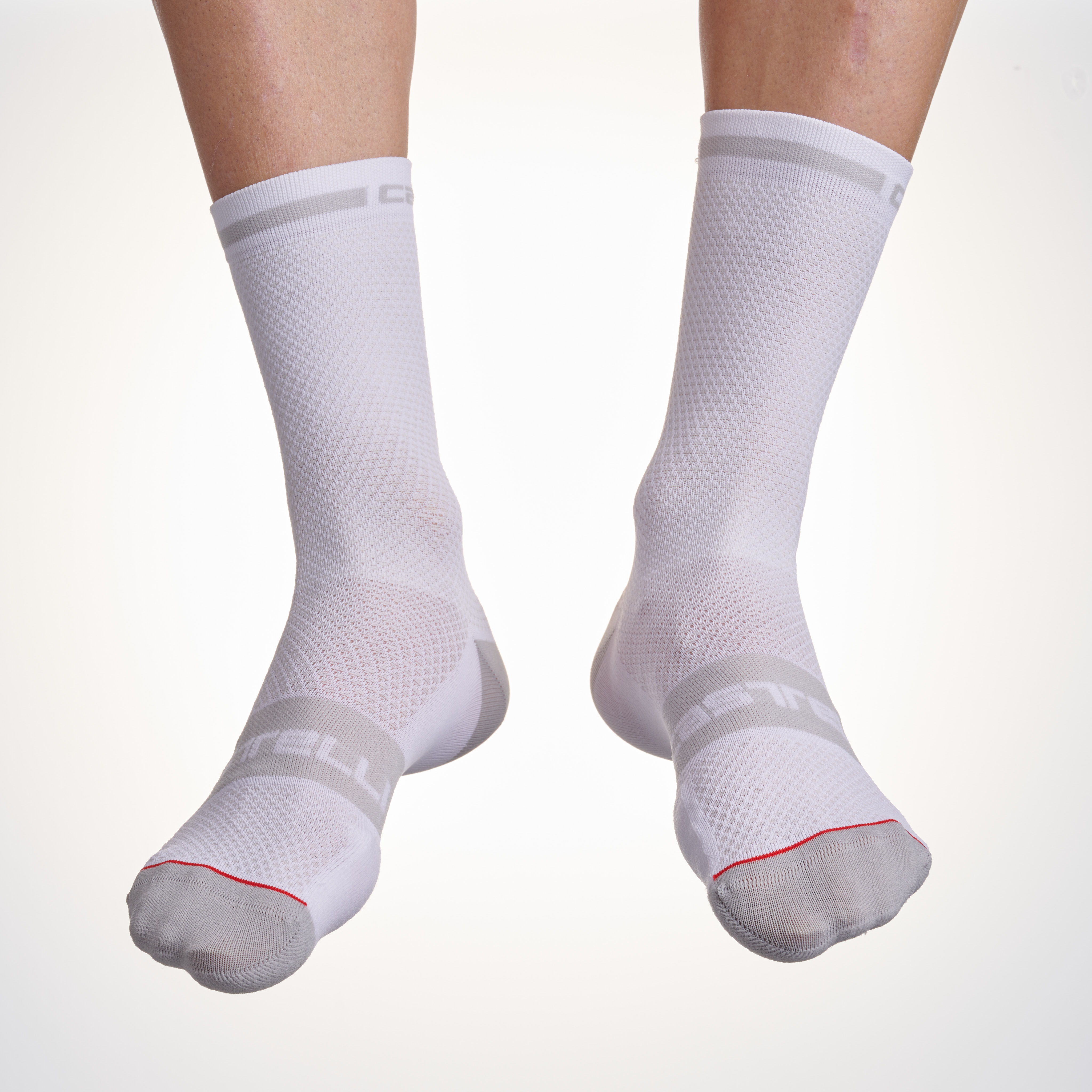
These are super lightweight socks for riding in the hottest conditions. The fabrics are quite thin, but the use of mesh helps the socks balance longevity with breathability - the threads are actually pretty thick. A panel underneath the forefoot provides some cushioning when pressing down in the pedal stroke, and the mid-height design will suit those looking for this length.
+ Very light and breathable
+ Cushioned forefoot
- Only for the hottest conditions
Like the Castelli Superleggera, these are another pair of lightweight socks for hot weather riding. Whereas the Superleggera socks employ a greater variety of thread thickness and mesh sections, these are much more uniform. We thought that breathability was about on par, whilst from our testing we think this design will likely last longer.
+ Lightweight and breathable
+ Good fit
- Basic construction

I would put these socks very closely on par with dhb’s Aeron LAB socks. Both are a little thicker than the super-light Assos Essence and Castelli Superleggera, but still provide fast wicking and good breathability. It’s a great option as a slightly more versatile performance sock - and they come in a range of tasteful colours.
+ Versatile for varying temperatures
+ Good breathability and wicking
- Neither super cool nor very warm
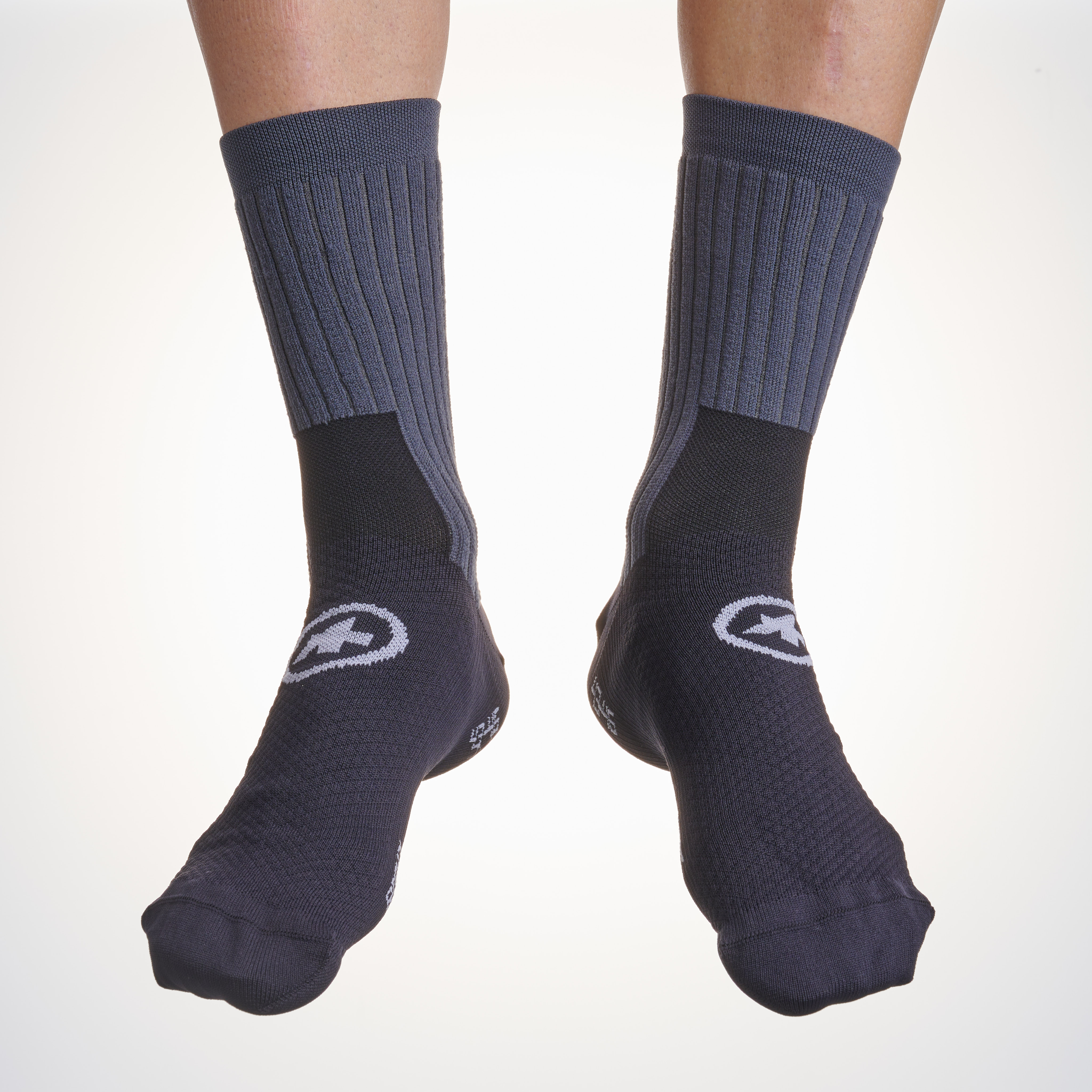
Our pick for gravel riding is the T3 Trail Socks from Assos. Perhaps best suited for gravel bike riders, these socks feature a robust construction, including a Shield Tec 3D structure to protect against branches and other trailside brush. They aren't the warmest compared to others on this list, but still perform solidly.
+ Tougher, off-road construction
+ Cooler and breathable foot section
- Not the warmest around the foot
How we test
You can't really ride without socks, and they are also a reasonably cheap item for brands to give away at events like Eurobike or slip into a package with the latest and best waterproof cycling jackets or even best road bikes. This means our team of cycling experts tests lots of socks, even when they aren't consciously putting them through their paces, and we learn what hot and what's not.
Socks endure a lot during cycling, and our team of testers will have worn them in various temperatures and conditions, all while using different pairs of the best cycling shoes. While comfort is subjective, our experienced testers aim to identify the specific area where a sock excels; this could be anything from a cuff that grips well but isn’t too tight, to a sock that offers good arch support and prevents hot spots.
While socks are a fairly affordable commodity in cycling, it's not something you want to be buying every couple of months. Given how exposed they can be to the elements, durability is a large part of what we are testing. This can include everything from how white a sock stays to how long the heel and toe box lasts. A big part of this is putting in the miles, but also repeated washes in the machine. Before we give any verdict on a sock, we would expect our testers to have been using it for at least a couple of months.
For more information on how the Cycling Weekly team conducts their testing, visit our 'How We Test' page.
How to choose the best cycling socks
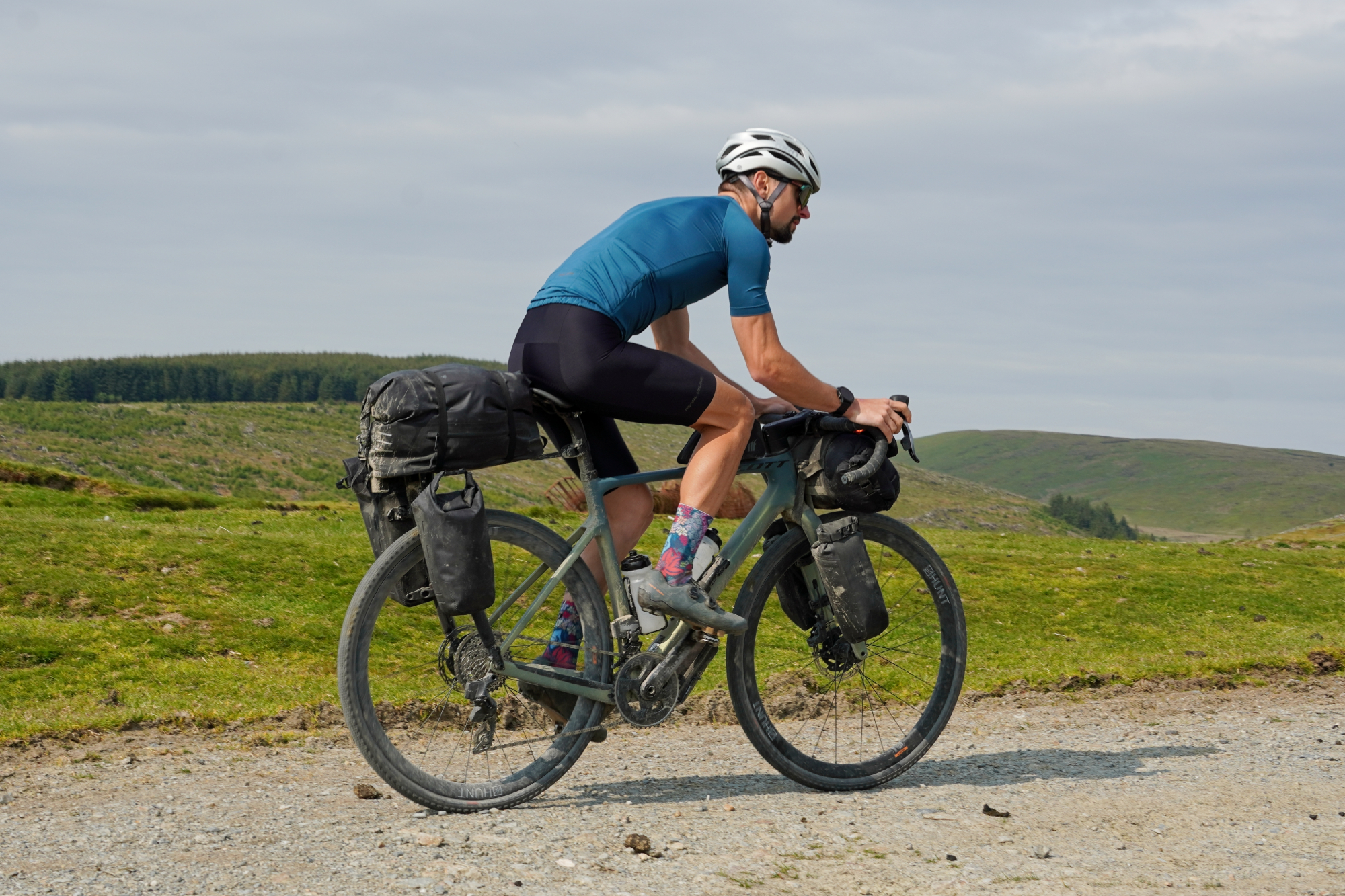
What are cycling socks ?
Cycling-specific socks are largely defined by their fit and the fabric. Given that cycling shoes are designed to be close-fitting, cycling socks tend to be thin so as not to make the shoes uncomfortable and provide a better connection to the pedals. Even winter cycling socks can be pretty thin and rely on low-bulk warmth from materials such as Merino wool.
While the aforementioned Merino wool is a popular choice given its breathability and odour resistance, most cycling socks use synthetic fabrics to deliver the desired combination of ventilation with sweat-wicking properties.
The final piece of the puzzle is good elasticity alongside a solid gripper - the last thing any cyclist wants is a pair of socks that won't stay up.
More advanced and expensive cycling socks can offer compression support or aero benefits. Compression helps by providing support to the muscles, preventing fatiguing micro-vibrations and improving blood circulation using calibrated pressure. Aero socks are said to be one of the most cost-effective wind-cheating gains available to a cyclist, despite the socks' relatively high price. They use textured ribbing to keep the air attached to the leg for longer thus reducing the low-pressure wake and reducing drag.
Do I need cycling socks?
Given that cycling shoes are designed to be close-fitting, cycling socks tend to be thin so as not to make the shoes uncomfortable and provide a better connection to the pedals. Even winter cycling socks can be pretty thin and rely on low-bulk warmth from materials such as Merino wool.
Cycling-specific socks will improve your comfort on the bike for several other reasons. The materials used are designed to keep your feet as cool as possible by wicking away sweat, drying rapidly and providing extra protection around the heel and toe areas. Winter socks will also wick away moisture but will insulate your feet against the cold rather than cooling them down.
Good cycling socks should also provide arch support to prevent fatigue and soreness on long rides and will be constructed to remain in place around the foot and calf without slipping down or moving around which could cause irritation or hotspots.
Should cycling socks be thin or thick?
Socks for cycling should be the right thickness for the type of riding you do, the temperatures you ride in and the fit of your shoes.
Thin socks will be cooler, work better with slim-fitting cycling shoes and provide a more direct connection to the pedals and bike with less chance of the foot moving around within the shoes.
Thick socks will be warmer but must be worn with shoes that have enough space in them to accommodate the socks. Cramming warm socks into close-fitting shoes will cause a lot of discomfort and probably make your feet colder by restricting blood vessels.
What length should cycling socks be?
Unless you're looking for cycling socks that promise some aerodynamic advantage, the answer is any height - presuming that you're not entering a UCI race. If you are you'll need to adhere to its rule that states:
'Socks and overshoes used in competition may not rise above the height defined by half the distance between the middle of the lateral malleolus and the middle of the fibula head.'
Outside of competition anything goes with sock height largely governed by taste and fashion. Aero socks tend to be tall, as do many 'pro' socks, which have grown in height over the years. Likewise, some winter socks are designed to cover the entire lower leg, adding another layer of insulation under your bib tights. Regular cycling socks typically feature a cuff that is between 3" and 7".
How do I choose the right socks for me?
As with most items of clothing, first and foremost it is comfort that is the most important consideration. Cycling socks might be worn for many hours (or even days!) of arduous exercise, so you don't want to give them a second thought once you start riding. This means that not only do they need to fit your foot, but they also need to work with your chosen shoes - a bulky sock might make your shoes too tight in a certain place, or a very thin sock might not offer enough volume around the heel for the shoe to fit securely.
The second consideration is the temperature you are likely to be using them. The best cycling sock in the world isn't going to work for you if it is designed to work in different conditions to those in which you are cycling. For cold weather, warmth and insulation are paramount whereas in summer temperatures the breathability and quick-wicking of a much lighter sock will be appreciated.
Do I need winter cycling socks?
If you ride in cold temperatures, then winter-weight socks should definitely form part of your cycling wardrobe, but they are not the only way to protect your feet. The Best Cycling Overshoes and best winter cycling shoes can also be used to insulate against the cold, and in fact, simply ramming a pair of thick socks into your normal cycling shoes may well make your feet colder rather than warmer, as the increased pressure will reduce warming blood flow.
The latest race content, interviews, features, reviews and expert buying guides, direct to your inbox!
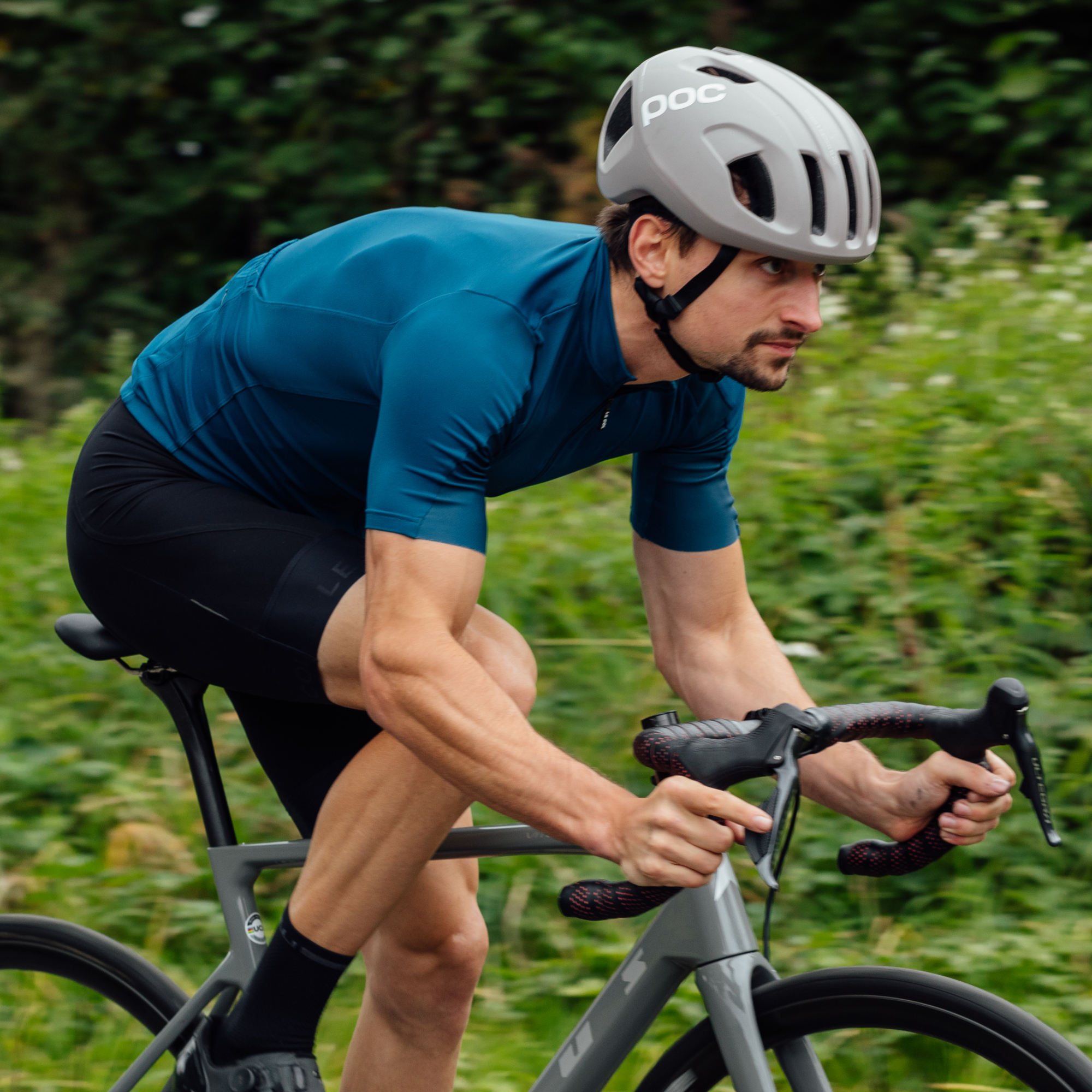
After winning the 2019 National Single-Speed Cross-Country Mountain Biking Championships and claiming the plushie unicorn (true story), Stefan swapped the flat-bars for drop-bars and has never looked back.
Since then, he’s earnt his 2ⁿᵈ cat racing licence in his first season racing as a third, completed the South Downs Double in under 20 hours and Everested in under 12.
But his favourite rides are multiday bikepacking trips, with all the huge amount of cycling tech and long days spent exploring new roads and trails - as well as histories and cultures. Most recently, he’s spent two weeks riding from Budapest into the mountains of Slovakia.
Height: 177cm
Weight: 67–69kg